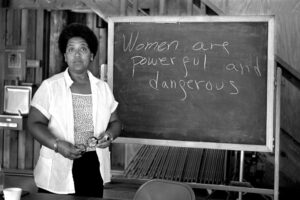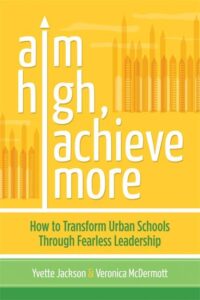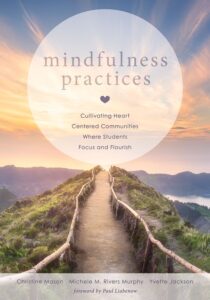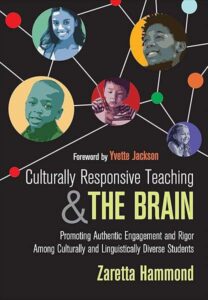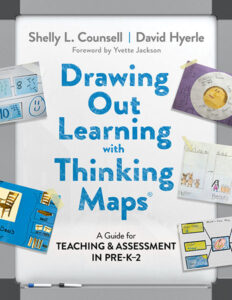The Pedagogy of Confidence • Dr. Yvette Jackson
High Operational Practices for High Intellectual Performance
- Modifiable intelligence: A core belief is that intelligence is not fixed and can be developed and changed.
- High expectations for all: The approach assumes all students benefit from and are capable of high intellectual performance.
- Culture, language, and cognition: Learning is viewed as a process influenced by the intersection of a student’s culture, language, and cognitive development.
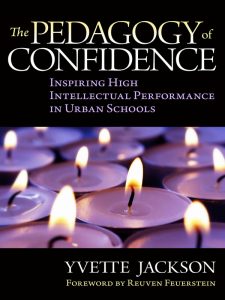 The Pedagogy of Confidence is based on many years of research and collaborations with Reuven Feuerstein, with National Urban Alliance (NUA), with many other organizations and colleagues focusing on equity consciousness in the spirit of belief and belonging for all students and educators. The Pedagogy of Confidence is focused on recognizing and amplifying the strengths underserved students.
The Pedagogy of Confidence is based on many years of research and collaborations with Reuven Feuerstein, with National Urban Alliance (NUA), with many other organizations and colleagues focusing on equity consciousness in the spirit of belief and belonging for all students and educators. The Pedagogy of Confidence is focused on recognizing and amplifying the strengths underserved students.
The goal of this action guide is to cultivate and sustain equity consciousness through The Pedagogy of Confidence. The Pedagogy of Confidence engenders robust communities of belonging in which students are gifted with High Operational Practices to inspire students’ engagement and elicit their innate potential for high intellectual performances, self-determination, and personal contribution.
The High Operational Practices (HOPs) are about belief in students and providing the educators the tools, methods and understanding to create robust communities of belonging in which students thrive and flourish. This online guide and modules provide support to in person professional development.
Pedagogy and equity cannot be isolated from each other. When we are truly committed to equity, we design pedagogy that achieves it’s original purpose: ‘to lead a child’ for self-actualization and self- transcendence: self-actualization that enables students to thrive in society and self-transcendence that motivates them to contribute to that society (Chen, 2014; Freire, 2012; Gladwell, 2008; Jackson, 2011). Equity consciousness is a way of educating that is informed by and situated in the belief that all students are innately wired for engagement, high intellectual performances, self-actualization and personal contribution. The High Operational Practices are:
- Situating Learning In The Lives Of Students: Students perform most effectively when they can connect new learnings to what is relevant and meaningful to them. These connections validate their lived experiences activating the focusing of the brain through its Reticular Activating System (RAS). Without such personal connections, the new learnings are not likely to be retained and used effectively.
- Identifying And Activating Student Strengths: Teaching that encourages students to recognize and apply their strengths releases neurotransmitters of pleasure, motivating students to actively participate and invest in a learning experience, set goals for their learning, and follow through with their learning for meaningful application and deeper development of strengths for personal agency.
- Building Relationships: Students fare best cognitively, socially and emotionally when they know they are liked, appreciated, valued as part of a vibrant, caring community. Positive relationships stimulate oxytocin, positively impacting both the motivation and the memory capacity critical for learning.
- Providing Enrichment: Enrichment taps students’ interests, generates strengths, expands their cognitive capacity, and guides them to apply what they know in novel situations for self-actualization.
- Integrating Prerequisites For Academic Learning: Foundation schema building activities are critical so that students have the right foundations for learning new information and acquiring new skills. This foundation heightens students’ understanding, competence, confidence, and motivation.
- Eliciting High Intellectual Performance: Students crave challenges. Their intelligence flourishes when they are asked to think at high levels about complex issues, demonstrate what they know in creative ways, and develop useful habits of mind such as reflection, raising substantive questions for deeper understanding and thinking flexibly and innovatively.
Newark Public Schools
High Operational Practices Rubric for Action
Purpose
The High Operational Practices Rubric is for whole school communities to self-assess their level of implementation of the Pedagogy of Confidence™ seven High Operational Practices (HOPs). The process is a nonevaluative, ongoing collaborative reflective process. The focus is continual growth for educators and students to create an intentional learning environment that is centered on students’ self-efficacy and belonging with an equity consciousness for High Intellectual Performance (HIPs).
Process
The HOPs Rubric provides descriptors that guide differentiation of levels of implementation of the Pedagogy of Confidence from Developing to Deepening to Demonstrating.
- Developing Not yet started or minimal implementation
- Deepening Systems are in place that are monitored and revised
- Demonstrating Transformational systemic efforts are evident and regularly monitored
Additionally there are two other input areas:
- Student evidences to consider at the Demonstrating level
- Evidences and Questions in the words of the reflecting observer
Intentionality
The goals of the differentiating levels of implementation effectively reflect on one’s pedagogy with intentionality. Intentionality of practice, intentionality of purpose, intentionality of supporting students with high operational practices for motivating and eliciting high intellectual performances. The HOPs Rubric pages provide context and goal-driven support dialogue between educators, educators and coaches, leaders and educators, paraprofessionals and teachers, and all adults interacting with the student scholars. Additionally, the HOPs Rubric guides the educators in dialogue with their student scholars that reflect and implement the HOPs within the classroom environment(s). This process is as much for the classroom teachers as all educators within the school building.
Research
Qualitative Research (2024) The qualitative study in Osseo Area Schools evaluated the effectiveness of a school-wide implementation of High Operational Practices (HOPs) for the 2023-2024 school year in six schools. The focus groups involved 100 participants including K-2 students, 3-5 students, and teachers. Specifically, we sought to understand the effectiveness and impact of High Operational Practices on student learning and teaching efficiency. The focus interview groups were conducted by Robert Seth Price in May 2024 that were coded for analysis and written by colleague Regina Seabrook for National Urban Alliance. Robert designed and prepared the final document (Nov 2024).
The qualitative study in Osseo Area Schools evaluated the effectiveness of a school-wide implementation of High Operational Practices (HOPs) for the 2023-2024 school year in six schools. The focus groups involved 100 participants including K-2 students, 3-5 students, and teachers. Specifically, we sought to understand the effectiveness and impact of High Operational Practices on student learning and teaching efficiency. The focus interview groups were conducted by Robert Seth Price in May 2024 that were coded for analysis and written by colleague Regina Seabrook for National Urban Alliance. Robert designed and prepared the final document (Nov 2024).
Newark Public Schools
Books
The Pedagogy of Confidence
Inspiring High Intellectual Performance in Urban Schools
Author: Dr. Yvette Jackson
Foreword By: Reuven Feuerstein
Yvette Jackson shows educators how to focus on students’ strengths to inspire learning and high intellectual performance.
Jackson asserts that the myth that the route to increasing achievement by focusing on weaknesses (promoted by policies such as NCLB) has blinded us to the strengths and intellectual potential of urban students—devaluing the motivation, initiative, and confidence of dedicated educators to search for and optimize this potential. The Pedagogy of Confidence dispels this myth and provides practical approaches for rekindling educators’ belief in their ability to inspire the vast capacity of their urban students.
–read more about
The authors of this guide to transformation in urban schools are convinced that the key ingredient for school renewal is fearless leadership. Fearless leaders work in schools under-resourced and overburdened and serve disproportionately large numbers of children who live in poverty and face racism daily. They are ordinary educators committed to proving that demographics need not be destiny.
This inspirational yet practical book will help you bridge the divide that separates urban students from their birthright of a high-quality education.
Mindfulness Practices
Cultivating Heart Centered Communities Where Students Focus and Flourish
Authors: Christine Mason, Michele M. Rivers Murphy, Yvette Jackson
Build compassionate classrooms and mindful schools that prioritize both learning and well-being. Based on the latest neuroscience research, this book provides mindfulness exercises as well as trauma-informed practices for creating positive learning environments.
–read more including the Table of Contents
Four teachers (4th and 5th grade) and their district coach share reflections on their experiences with The Pedagogy of Confidence framework part of the collaboration with National Urban Alliance.
National Urban Alliance implementing The Pedagogy of Confidence.
Amplifying Teacher and Student Voices — in action with The Pedagogy of Confidence HOPs (High Operational Practices).

